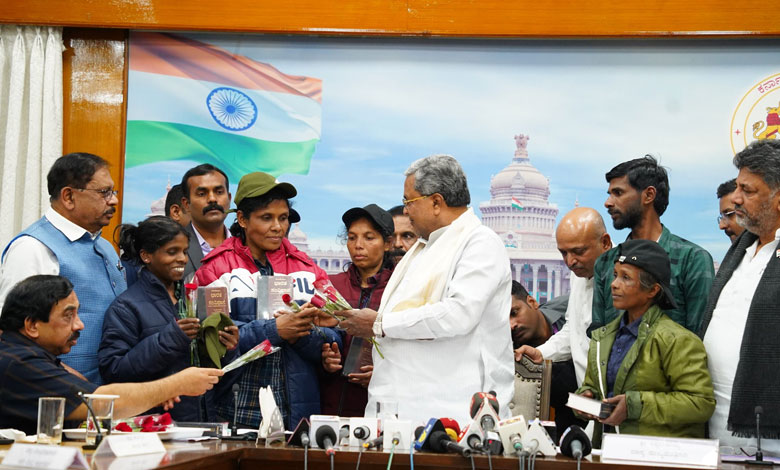Surrendered Maoists in Karnataka to Appear Before Court After Formalities
Six surrendered Maoists in Karnataka are set to be produced before the court after completing formalities. The investigation focuses on weapon recovery, while the political and public responses remain divided.

Bengaluru: Six Maoists, who recently surrendered to authorities in Karnataka, are expected to be produced before the court after completing necessary legal formalities.
The group includes four women and two men, and their surrender has sparked significant political and public discussion.
Table of Contents
Surrendered Maoists in Police Custody:
The four women Maoists have been brought to the Forensic Science Laboratory (FSL) in Bengaluru from the Mahila Santhwana Centre, while the two male Maoists are being held in a special cell at the FSL. Sources have confirmed that the authorities plan to present the group before the National Investigation Agency (NIA) Special Court for the ongoing cases linked to their activities.
The surrender of these Maoists is part of the broader efforts by the Karnataka government to address Left-Wing Extremism (LWE) within the state. The authorities are now focusing on the recovery of weapons and other materials associated with the surrendered Maoists, as these individuals did not fully comply by surrendering their arms.
Investigation and Weapon Recovery:
According to sources, the Maoists did not hand over their firearms when they surrendered. Instead, they symbolically presented green uniforms to Karnataka Chief Minister Siddaramaiah, which raised suspicions regarding the weapons they may still be hiding. The authorities have since gathered information regarding their possession of dangerous arms, and efforts are underway to confiscate these weapons.
Deputy Superintendent of Police Balaji Singh, who has been assigned to the case, is traveling to Bengaluru to question the surrendered Maoists and investigate the recovery of their arms. It is expected that the authorities will complete the weapon recovery process shortly.
Political Reactions and Public Response:
The surrender of the Maoists has been met with mixed reactions. On Wednesday, Chief Minister Siddaramaiah welcomed the six Maoists into the mainstream, offering them roses and copies of the Indian Constitution at his official residence in Krishna, Bengaluru. This gesture, aimed at reintegrating the former Maoists into society, has stirred political controversy.
The Congress-led Karnataka government claims that the surrender marks a significant achievement in the state’s battle against Left-Wing Extremism. By accepting the Maoists into the mainstream, the government has declared Karnataka as a Left-Wing Extremism-free state.
However, the opposition has raised concerns. The BJP has criticized the government for offering what they consider “royal treatment” to the surrendered Maoists. They argue that such gestures might embolden extremist elements and undermine the severity of their past crimes.
Also Read | Karnataka Lokayukta Raids Seven Government Officials Over Disproportionate Assets
Details of the Surrendered Maoists:
The six Maoists who surrendered are:
- Mundagaru Latha (Sringeri)
- Vanajakshi (Balehole, Kalasa)
- Sundari (Kutluru, Mangaluru)
- Marappa Jayanna Aroli (Raichur)
- Vasantha T. aka Ramesh (Tamil Nadu)
- T.N. Jeesha (Kerala)
According to police sources, these individuals have been involved in several criminal activities over the years. The number of cases they face are:
- Mundagaru Latha: 85 cases
- Sundari: 71 cases
- Marappa Jayanna Aroli: 50 cases
- Vanajakshi: 29 cases
- Vasantha T. aka Ramesh: 8 cases
- T.N. Jeesha: 17 cases
The Surrender-cum-Rehabilitation Scheme for Left-Wing Extremists allows these Maoists to receive financial support as part of their reintegration into society. The Chikkamagaluru district authorities have approved a Rs 3 lakh subsidy for each of the surrendered Maoists under this scheme.
Government’s Stance on the Surrender:
The Karnataka government, led by Chief Minister Siddaramaiah, has emphasized that this move is part of a comprehensive rehabilitation initiative aimed at addressing the issues of Left-Wing Extremism. By offering financial assistance and social integration programs, the government believes that these former Maoists can lead peaceful lives and contribute to the state’s development.
